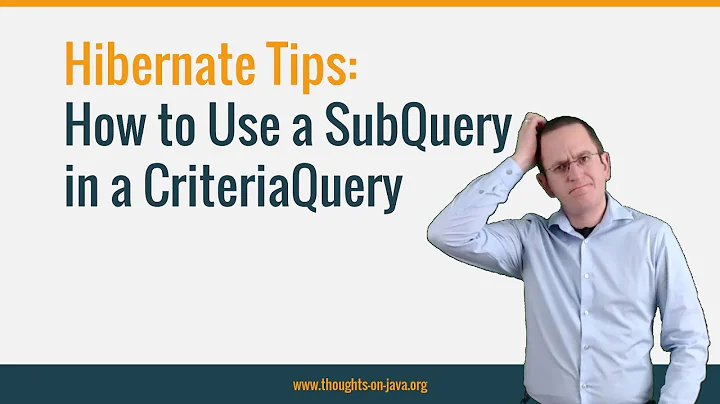using a ParameterExpression versus a variable in JPA Criteria API
you can use ParameterExpression like this: assume that you have some input filter, an example could be this:
- in your query you have to check the value of a fiscal Code.
let's start: first of all create criteriaQuery and criteriaBuilder and root
CriteriaBuilder cb = _em.getCriteriaBuilder();
CriteriaQuery<Tuple> cq = cb.createTupleQuery();
Root<RootEntity> soggettoRoot = cq.from(RootEntity.class);
1) inizialize a predicateList(use for where clause) and a paramList(use for param)
Map<ParameterExpression,String> paramList = new HashMap();
List<Predicate> predicateList = new ArrayList<>();
2 )check if the input is null and create predicateList and param
if( input.getFilterCF() != null){
//create ParameterExpression
ParameterExpression<String> cf = cb.parameter(String.class);
//if like clause
predicateList.add(cb.like(root.<String>get("cf"), cf));
paramList.put(cf , input.getFilterCF() + "%");
//if equals clause
//predicateList.add(cb.equal(root.get("cf"), cf));
//paramList.put(cf,input.getFilterCF()());
}
3) create the where clause
cq.where(cb.and(predicateList.toArray(new Predicate[predicateList.size()])));
TypedQuery<Tuple> q = _em.createQuery(cq);
4) set param value
for(Map.Entry<ParameterExpression,String> entry : paramList.entrySet())
{
q.setParameter(entry.getKey(), entry.getValue());
}
Related videos on Youtube
Henno Vermeulen
Java specialist with a passion for programming from an early age (Basic, Turbo Pascal , C++). I am an analytical thinker, motivated and dedicated to create high quality software by using the industry's best practices. Very good in analyzing user requirements and translating these to a sound design and corresponding implementation. Experienced with test-driven development and continuous integration through Jenkins CI, using Maven and ANT. I have good domain-modeling skills and experience in both front-end (Eclipse RCP, SWT/JFace, Swing) as well as back-end technology (JPA, SQL) and everything that glues these together (Spring Framework, JMS).
Updated on September 15, 2022Comments
-
 Henno Vermeulen over 1 year
Henno Vermeulen over 1 yearWhen using the JPA Criteria API, what is the advantage of using a ParameterExpression over a variable directly? E.g. when I wish to search for a customer by name in a String variable, I could write something like
private List<Customer> findCustomer(String name) { CriteriaBuilder cb = em.getCriteriaBuilder(); CriteriaQuery<Customer> criteriaQuery = cb.createQuery(Customer.class); Root<Customer> customer = criteriaQuery.from(Customer.class); criteriaQuery.select(customer).where(cb.equal(customer.get("name"), name)); return em.createQuery(criteriaQuery).getResultList(); }With parameters this becomes:
private List<Customer> findCustomerWithParam(String name) { CriteriaBuilder cb = em.getCriteriaBuilder(); CriteriaQuery<Customer> criteriaQuery = cb.createQuery(Customer.class); Root<Customer> customer = criteriaQuery.from(Customer.class); ParameterExpression<String> nameParameter = cb.parameter(String.class, "name"); criteriaQuery.select(customer).where(cb.equal(customer.get("name"), nameParameter)); return em.createQuery(criteriaQuery).setParameter("name", name).getResultList(); }For conciseness I would prefer the first way, especially when the query gets longer with optional parameters. Are there any disadvantages of using parameters like this, like SQL injection?
-
 Henno Vermeulen almost 11 yearsThat's a good thing to know. I prefer simpler code above optimized code until it is identified as a problem. The problem I have with using parameters for optional criteria in the where clause is that you need to have repeated code like "if (optionalParameter != null)" to declare and set the parameter. Your second answer confuses me. I always thought that (up to possible implementation bugs) parameters were guaranteed to not suffer from SQL injection attacks and I was wondering if my simpler first way can suffer from SQL injection. I am using OpenJPA by the way.
Henno Vermeulen almost 11 yearsThat's a good thing to know. I prefer simpler code above optimized code until it is identified as a problem. The problem I have with using parameters for optional criteria in the where clause is that you need to have repeated code like "if (optionalParameter != null)" to declare and set the parameter. Your second answer confuses me. I always thought that (up to possible implementation bugs) parameters were guaranteed to not suffer from SQL injection attacks and I was wondering if my simpler first way can suffer from SQL injection. I am using OpenJPA by the way. -
Alex78191 about 6 yearsWill SQL injection be possible if parameters are not used?





